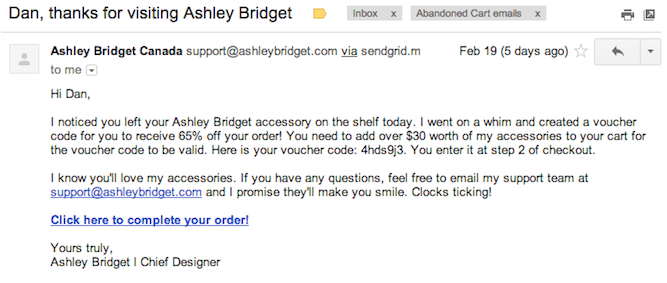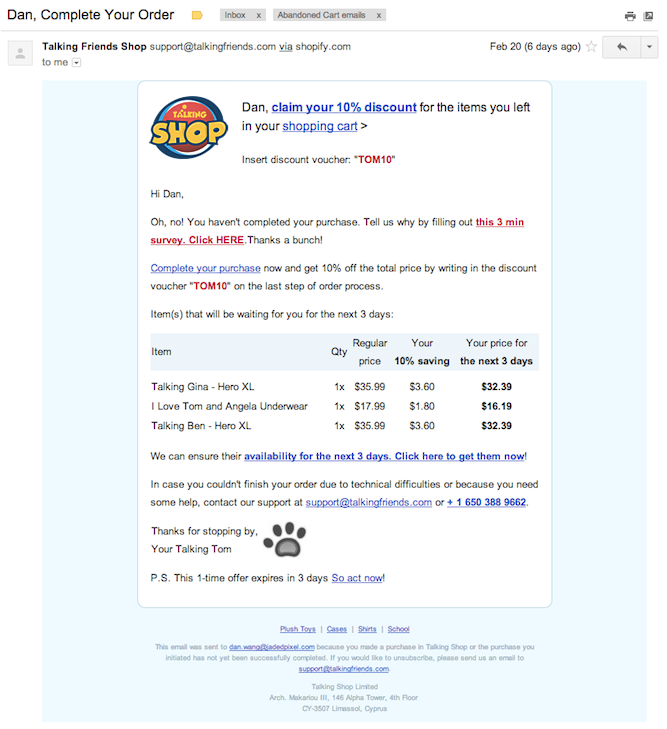It’s always a bit of a head-scratcher when you find an abandoned shopping cart in a grocery store. It makes you think there must have been some emergency, because who changes their mind midway through a shopping trip and just leaves a full cart in the middle of the store? It’s curious behavior in a brick-and-mortar store, but in eCommerce, it’s completely normal — and all too common
On average, nearly three quarters of all online shopping carts get filled up but never checked out. Hardware can be a factor. Customers are 10% more likely to ditch a shopping cart on their mobile devices than when shopping on a desktop computer
It’s easy for online shoppers to get distracted and abandon a cart. An incoming phone call, an impulse to compare prices at another store, a dying battery—it doesn’t take much to break the eCommerce spell. The good news is, shoppers who are reminded that their abandoned carts are still out there waiting have a decent chance of coming back to complete their order
Abandoned cart emails are the primary tool merchants have for luring fickle customers back in. The key to sending successful emails is to know your customers—what causes them to abandon their carts, what would entice them to return, and what you’re trying to say about your brand and shopping experience with the messaging and imagery you use
Well-targeted abandoned cart emails have a high click-through rate, and nearly half of all customers who engage with abandoned cart emails will go on to complete an order. If you want to craft emails that bring your carts back to the checkout page, read on for five essential templates you can adapt for your store
Email #1: The Time-Sensitive Discount
Sometimes, it’s that final price tag that makes a shopper sidle away from an overflowing shopping cart. Rather than go through the buzz-killing process of removing items until it becomes a more manageable expense, they’ll just give up on the whole thing altogether
One of the best antidotes for sticker shock is a nice discount that rewards decisiveness. Give these customers a window of opportunity to come back and reclaim their cart at a lower price, and many of them will

Try a subject line like “24 Hour Offer: Get 15% Off {{name of product they had in their abandoned cart}}”. This will gently remind customers of what they were thinking about buying, and give them an incentive to purchase, now that it’s cheaper than it was when they started shopping

The above example is unique because it takes a different approach to cart abandonment. Most (smart) cart abandonment emails will use user data to try to understand the reason a user did not complete purchase and provide a suggestion. The above takes a different approach and covers almost every possible base. It would be interesting to test an email like the above vs. a more focused approach.
Email #2: The Tangent
When price isn’t the issue, another leading cause of cart abandonment is when the product is almost, but not quite, what the customer was looking for. They may place the almost-right item in their cart as a placeholder or backup option, but it’s not really what they want, so they don’t finalize the purchase
As a merchant, sometimes you (or the algorithms powering the product recommendation functions on your website) can figure out what your customers are looking for before they can find it on their own. This can often be the case when you’re selling specific parts or tools, or other products where knowing what to buy may require some specialized knowledge

A “Couldn’t find what you were looking for?” email that links to similar or related products can be all you need to help get a confused customer back on track. You’ll get the sale, and they’ll be happy to have found the thing they really needed
Email #3: Low Stock Alert
Some customers aren’t driven by purely rational concerns like staying within their budget, or making sure they’re buying the one specific product they actually need. Some customers shop on a whim, toss things in their cart, and move on as the mood strikes them. You’re not going to get them back by offering them a discount or suggesting other products they might want. But you might get them back by appealing to their FOMO—fear of missing out.

Magic phrases like “only a few left in stock,” “limited quantities of {{product}} available,” or “this item sells out fast” can be all you need to spark a sense of urgency, motivating these customers to come back and complete their order, so they don’t miss out
Email #4: The Fee Waiver
When it’s not feasible to offer direct price discounts on an item, you have to get a little creative when coming up with incentives for returning customers. One easy way to do this is to waive any fees that might come with the order
For example, on a subscription-based service, a 15% discount on the first monthly charge might not matter much to the customer. An ongoing 15% discount might not be sustainable for your business. However, a one-time setup fee might be the perfect thing to entice a customer who’s on the fence.

Free shipping can be another good offer, but what if you really don’t have any added fees you can waive? In that case, you can always send an email reminding customers of your generous, hassle-free, full-refund return policy
Email #5: The Comedian
When all else fails, you can always try to win a customer back by making them laugh. After all, some customers don’t abandon carts on purpose, but because they got distracted, or their browser crashed. In those instances, all they might need is a heads-up that their cart was saved for them. A light, humorous message is a great way to draw their attention to that fact
Another great thing about humor is that it sets you apart from the rest and provides you with an identity. When the consumer is shopping around and comparing different online stores not only will yours stand out from the crowd but it will do so by creating a fun shopping experience, and building a familiar relationship. After all, we’re a lot more likely to purchase from friends than we are from strangers. Here’s a great example by Greycork of how to use humor to build a familiar, eye-level, relationship with your customer.

If you can get creative with your abandoned cart emails to zero in on a particular demographic or attitude that your brand appeals to, you might be able to close the deal on a few abandoned carts through the strength of your wit and charm. This approach can fall very flat if you execute it wrong, but if you know your customers and how to speak their language, it can be extremely effective.
It may be a little cheesy, but don’t be afraid to hit your customer in the feels with a little anthropomorphization. For certain customers, if you tell them “Your shopping cart misses you! Come back!”—they will
Bonus: The All In One
Why choose?! Many digital shops adopt a kitchen sink approach to abandoned cart emails. Because why choose just one if you can have the benefit of all types of cart abandonment emails in one. Once again, it’s advisable to test this approach vs. more focused or just plain different messaging to see what resonates best and improves conversion rates. However, the all-in-one approach is very common with many of the top online retailers like ASOS:

Don’t Give Up On Abandoned Carts
The fact is, not every abandoned shopping cart is recoverable — but many are. You never know how many have potential checkouts in their future, but you will if you do whatever you can to follow up with your customers. Be sure to remind them that they left a full shopping cart behind, and try to give them a compelling reason to come back and place an order
There are many reasons why a customer might abandon a shopping cart, so you have to use your best judgment (and analytics) to target those customers with the right message. Remind them what they were shopping for, how many other great products you have, and what you’re willing to offer to entice them back. With applied diligence and creativity, you’ll start seeing some revenue-boosting reunions between your customers and their abandoned carts



